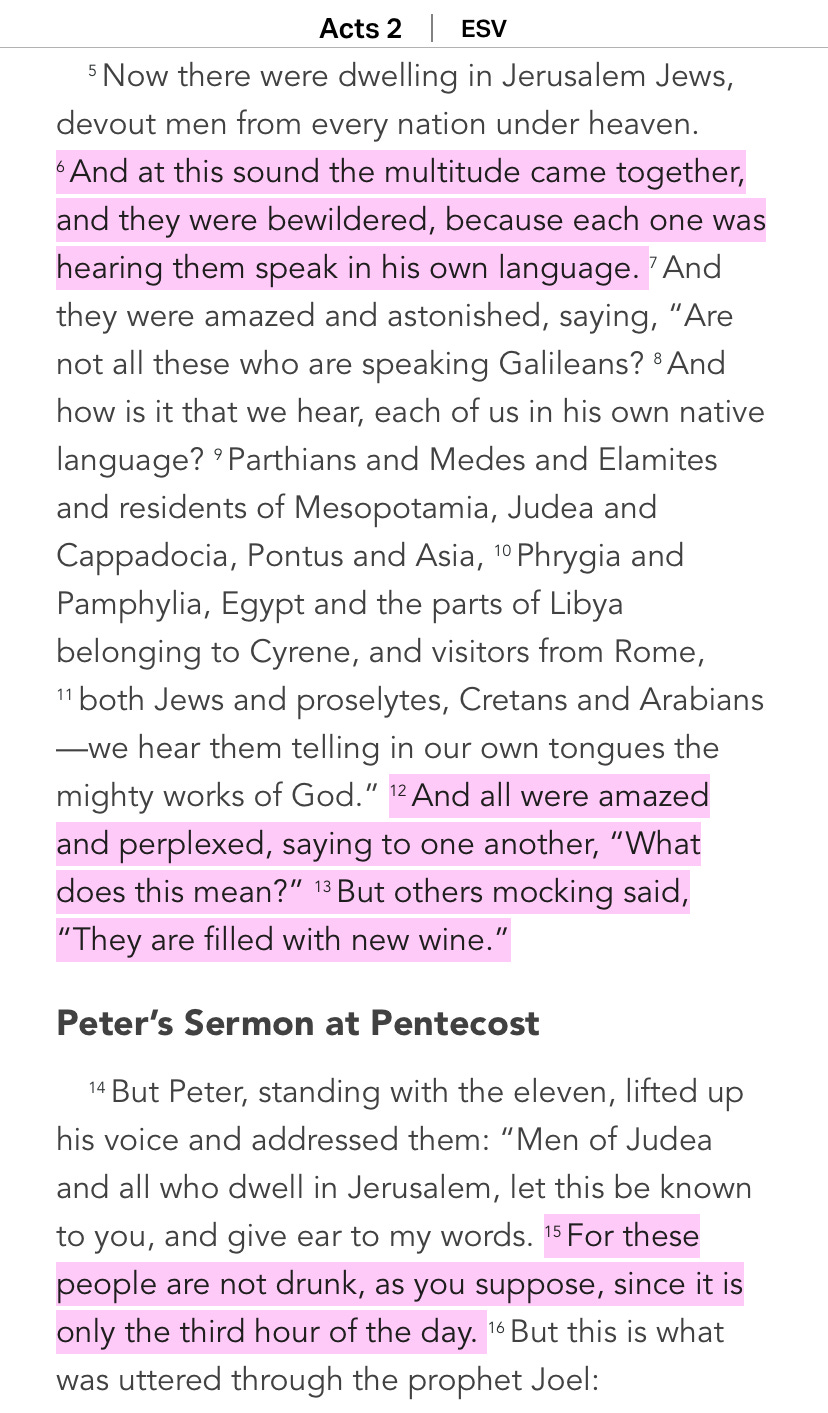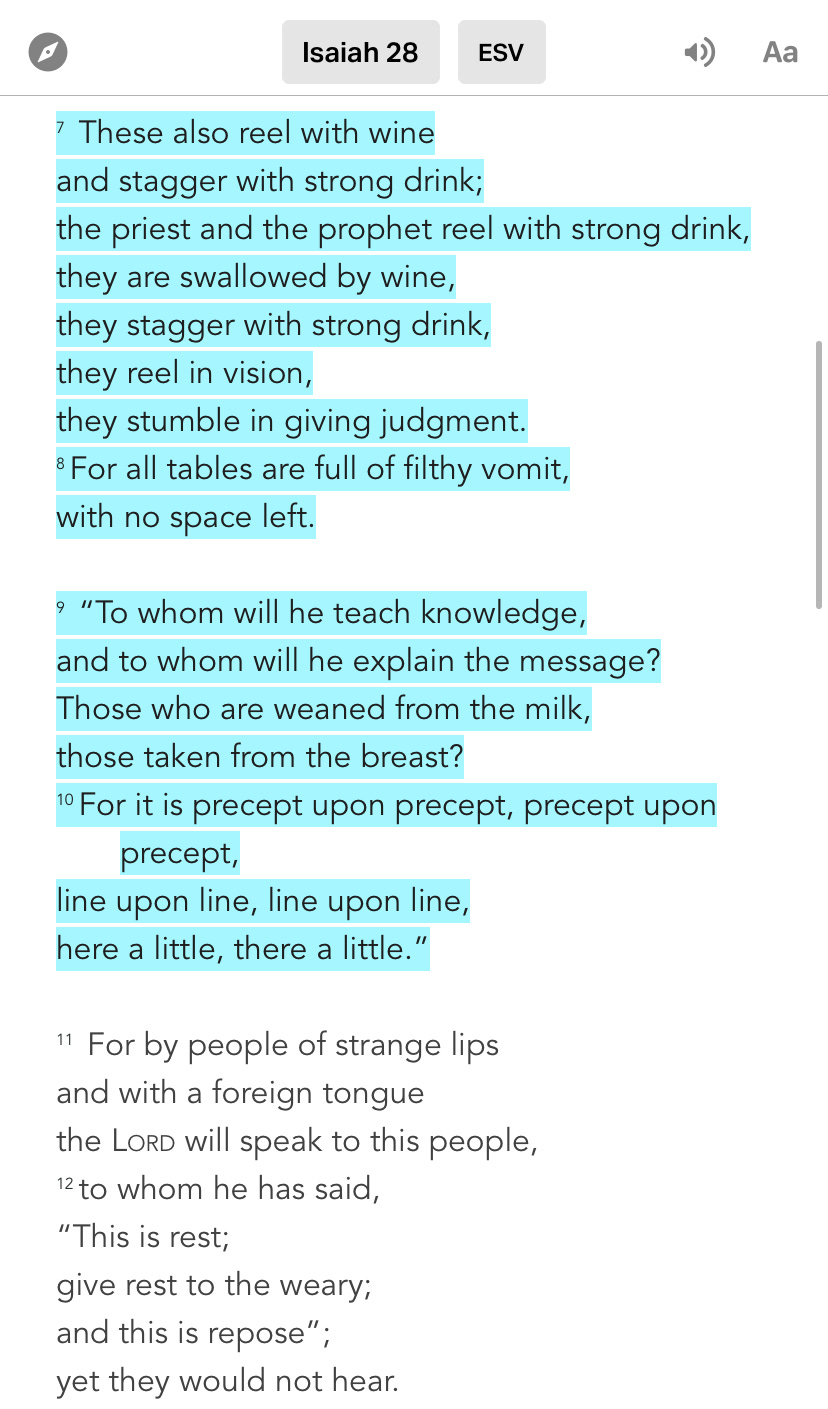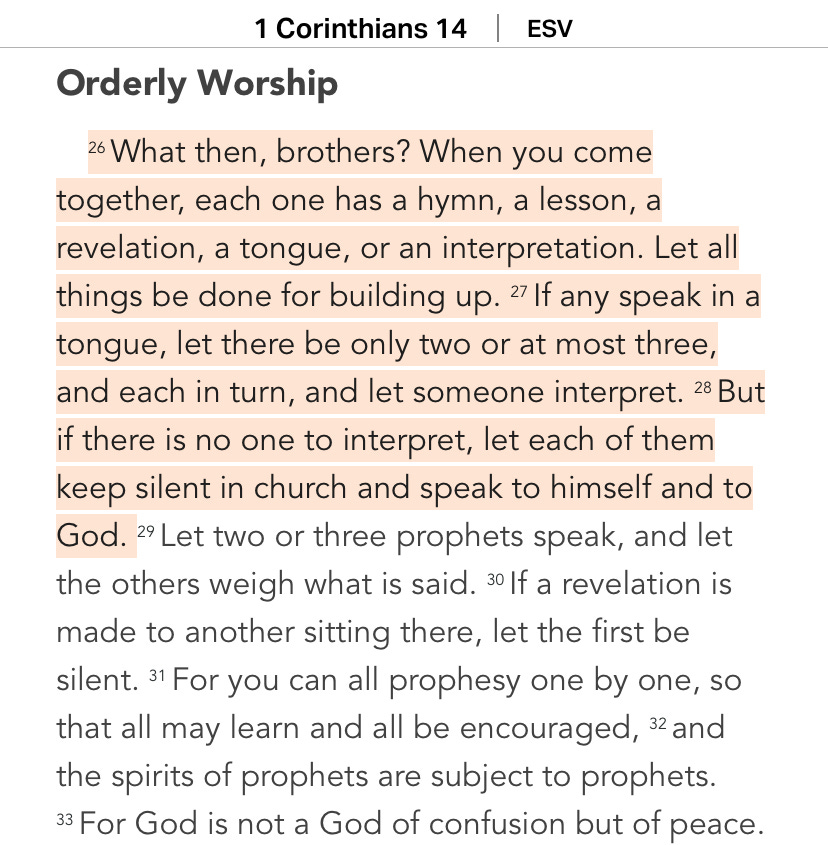On the Gift of Tongues, Pt. 3: The fulfillment of prophecy
An exposition of 1 Corinthians 14
If you have not yet read Part 1 and Part 2, please read them first as all parts of this series go together and build on one another. You can find part 1 and part 2 here and here.
For the second time in his exhortation on spiritual gifts, Paul admonishes the Corinthians not to be immature in their thinking about the purpose of this particular manifestation of the Spirit.
He says this as a preface to pointing them back to the Old Testament where the second purpose of the gift of tongues is revealed. (The primary purpose being to sanctify the church body and spread the gospel to those at home and abroad.)
A sign of judgment
In 1 Corinthians 14:21, Paul quotes a prophecy about foreign tongues written in Isaiah 28:11. This prophecy, like many in the Old Testament, was about the gentiles accepting the gospel while the Jews rejected Christ. As a sign for the Jews of their judgment for rejecting Christ, God manifests the gift of tongues among the believers in the church starting on the day of Pentecost in Acts 2. Thus, fulfilling this prophecy and substantiating Paul’s statement that tongues are a sign for unbelievers, especially unbelieving Jews—a sign of their judgment.
Compare this with Isaiah 28:11:
Compare also with Acts 2:
But there is still more to this prophecy. Let’s look again at Isaiah 28, backing up to read some of the verses preceding verse 11:
The actual drunkards of Ephraim and Jerusalem from Isaiah 28 (verse 3; not pictured) were now ironically accusing the remnant of God’s people of being drunk. The tongues spoken by the church in Acts 2 were the fulfillment of the prophecy from Isaiah 28. This was a sign of God’s judgment falling on Israel for her unbelief. Because of the foreign tongues, the Jews were confused and unable to judge what was happening or that it was a move of God.
The people of Israel stumbled in giving judgment because of this “new wine” of the Holy Spirit. As Acts 2 says: they were perplexed.
Because the Jews rejected Christ and the message of the apostles, to whom were the deep things of God taught? The Gentiles—in the epistles. They were babies in the faith, those “taken from the breast” since they had not had the words of God from the beginning as Israel had.
A sign for unbelievers: the meaning is concealed
The reason the speaking of tongues was a sign for unbelievers (particularly Jews at the time of Paul’s writing) is because they were not able to understand the message. This was evidenced at Pentecost when the disciples began speaking in foreign tongues and the people thought they were drunk. Yet, at the same time, many who heard the gospel in their own language were added to their numbers.
And even those Jews who were able to understand with an interpretation would know this passage from Isaiah and maybe recognize the foreign tongues as a sign of the Word of God being dispersed among the gentiles, indicating their judgment for rejection of his Word. The giving of the gospel to the gentiles was prophesied over and over again in the Old Testament and something Jesus himself spoke of in parables all through the gospels. Parables were another means God used to conceal the truth from unbelievers so that they could not understand.
“Then the disciples came and said to him, ‘Why do you speak to them in parables?’ And he answered them, ‘To you is has been given to know the secrets of the kingdom of heaven, but to them it has not been given. For to the one who has, more will be given, and he will have an abundance, but from the one who has not, even what he has will be taken away. This is why I speak to them in parables, because seeing they do not see, and hearing they do not hear, nor do they understand. Indeed, in their case the prophecy of Isaiah is fulfilled that says: ‘You will indeed hear but never understand, and you will indeed see but never perceive.’ For this people’s heart has grown dull, and with their ears they can barely hear, and their eyes they have closed, lest they should see with their eyes and hear with their ears and understand with their heart and turn, and I would heal them.’” - Matthew 13:10-15
It is also reminiscent of Romans 1 where God “gave them up to a reprobate mind” so that they were not able to come to a knowledge of the truth and repent; people who would not acknowledge God or give him thanks; unbelievers.
Or Romans 9-11, which tells us of the partial hardening of Israel so that the gentiles may receive the gospel. The giving over of a society to reprobate thinking so that they are unable to understand or accept the things of God is a sign of judgment coming on that people.
Many times we see God using various means to conceal understanding. Parables, giving people over to their sin, and here we see tongues at Pentecost serving the same purpose.
However, Paul is not encouraging tongues being used en masse so as to turn away the unbeliever. (And that’s exactly what their misuse does if you think about the mass chaos of many charismatic churches today where people are “speaking in tongues” all at once. How does the unbeliever look at that? “You’re out of your minds!” Just as scripture says. And they ARE because that’s not even a biblical use of tongues. It’s counterfeit.)
Later Paul gives instructions on how tongues should be used in the church—in an orderly fashion, with an interpreter, one at a time, and two or three at most. So that those listening (believer and unbeliever alike) CAN benefit from it. This was also a set of rules that would allow the Corinthians to differentiate between a Holy Spirit-given tongue and ecstatic speech from pagan religion that was so prolific at that time.
A sign for believers: the meaning is revealed
In contrast to the confusion of all speaking in tongues (with no interpretation), Paul shows us that if all prophesy, the unbeliever is able to hear the works of God (i.e. the gospel) proclaimed. By this he is called to account and is able to come to repentance and believe! Thus, the purpose of the gift is fulfilled—sanctification of the body and salvation for the unbeliever.
And the speaking of tongues achieves the same ends when used in the scriptural way, making them intelligible by those who hear.
I think also of the illustration of the veil. The veil is lifted for those in Christ so that he is revealed to them in the scriptures:
“But when one turns to the Lord, the veil is removed. Now the Lord is the Spirit, and where the Spirit of the Lord is, there is freedom. And we all, with unveiled face, beholding the glory of the Lord, are being transformed into the same image from one degree of glory to another. For this comes from the Lord who is the Spirit.” - 2 Corinthians 3:16-18
Orderly worship
And finally, Paul gives instructions on orderly worship, including instructions on how tongues are to be used so that they may benefit those who hear in the same way that prophecy benefits all who hear. The final word he gives on the subject is that if you don’t have an interpreter and can’t interpret the tongue yourself, then keep it between you and God.
This doesn’t mean you should view the gift as something to be used privately for your own edification, but that it is simply not to be employed where no one will benefit.
The case for cessation AND continuation
I would conclude that the gift of tongues (as seen during the writing of the New Testament) along with the other apostolic sign gifts have ceased, though God can and certainly does intervene miraculously in individual circumstances still today. Broadly speaking, the only time that miraculous signs appeared in scripture was when the prophets were speaking; that is to say, scripture was being written and/or a message from God was being authenticated.
According to Hebrews 1, we know Jesus was the LAST prophet; at the conclusion of his ministry, Jesus personally appointed the twelve apostles and personally gave them his authority to prophesy and write scripture, which would govern the church from its conception onward:
“Long ago, at many times and in many ways, God spoke to our fathers by the prophets, but in these last days he has spoken to us by his Son, whom he appointed the heir of all things, through whom also he created the world.” - Hebrews 1:1-2
“And I tell you, you are Peter, and on this rock I will build my church, and the gates of hell shall not prevail against it. I will give you the keys of the kingdom of heaven, and whatever you bind on earth shall be bound in heaven, and whatever you loose on earth shall be loosed in heaven.” - Matthew 16:18-19
I propose this:
Though the apostolic signs we see during the birth of the New Testament church have ceased, the gift of the gospel being spoken in foreign tongues has continued to this day. But perhaps not in the “miraculous” way we might think. What is occurring today is a greater miracle. The gospel is being spoken among virtually every tribe, tongue and nation today on the witness of only five hundred people whom Jesus appeared to after his resurrection; even more remarkable, the whole world is hearing and speaking the gospel on the testimony of only twelve appointed men.
The gospel is still being spoken in foreign tongues today—it has been ever since the day of Pentecost. We are the foreigners the gospel has been brought to thanks to this working of the Holy Spirit through the gift of speaking in tongues in the early church. The goal has been and is still in the process of being achieved. Today, with the advancement of technology, the gospel is on its way to being known by the entire world. Just as the Apostle John was shown in his vision in the Revelation:
“Then I saw another angel flying directly overhead, with an eternal gospel to proclaim to those who dwell on the earth, to every nation and tribe and language and people.” - Revelation 14:6
“After this I looked, and behold, a great multitude that no one could number, from every nation, from all tribes and peoples and languages, standing before the throne and before the Lamb, clothed in white robes, with palm, branches in their hands,” - Revelation 7:9
Along these same lines, we can see the church is still prophesying as well—every time the written words of the prophets and apostles are preached, for these are the foundation the church is built on (Ephesians 2:20). The proclamation of their testimony has continued, again, perhaps not in the “miraculous” way we might think. This is the “greater work” that Christ spoke of when he said:
“Truly, truly, I say to you, whoever believes in me will also do the works that I do; and greater works than these will be do, because I am going to the Father.”
- John 14:12
The time of apostolic signs has passed. Though these were great works that authenticated Christ’s divinity and the message of the apostles, they are no longer needed, for we have our risen savior and our written gospel. The message has been received. By us, praise God, “people of strange lips and with a foreign tongue.” We live in the time of greater works, a time, no doubt, the prophets, apostles, and the early church would have marveled to see: people from every tongue… prophesying the works of God.










